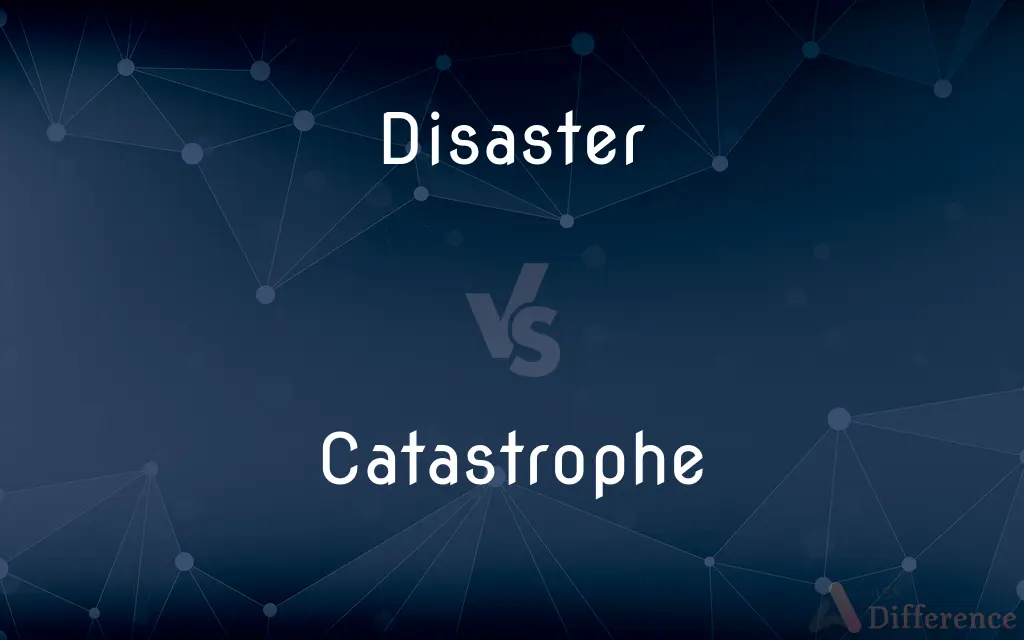Disaster vs. Catastrophe — What's the Difference?
Edited by Tayyaba Rehman — By Fiza Rafique — Updated on March 25, 2024
Disasters often imply significant damage and disruption, whereas catastrophes denote events of massive scale and profound impact.

Difference Between Disaster and Catastrophe
Table of Contents
ADVERTISEMENT
Key Differences
Disasters are events that cause significant harm to life, property, and the environment, often resulting from natural occurrences like hurricanes or human-induced situations such as industrial accidents. On the other hand, catastrophes are extreme disasters that lead to widespread devastation, often irreversible, affecting large populations or regions. They typically involve a higher degree of impact and longer recovery periods.
While disasters can be localized, affecting communities or specific areas, catastrophes usually have a broader reach, potentially impacting entire countries or crossing national borders. This scale difference often necessitates international aid and intervention in the case of catastrophes.
Disasters are often managed with local or national emergency response mechanisms, including rescue operations and relief efforts. Catastrophes, due to their magnitude, usually overwhelm local response capacities, requiring substantial international support and humanitarian aid.
The term disaster might be used in a broader sense, encompassing a wide range of adverse events, from moderate to severe. Catastrophe, however, implies an upper threshold of damage and impact, often used to describe the most severe scenarios.
Both disasters and catastrophes can have long-term effects on the affected communities, including economic downturns, health crises, and displacement. However, the recovery and rebuilding process after a catastrophe can be particularly prolonged and challenging, often involving significant changes to infrastructure, governance, and community structures.
ADVERTISEMENT
Comparison Chart
Scale
Can be localized, affecting limited areas or communities.
Massive in scale, often impacting large regions, countries, or crossing national borders.
Impact
Significant harm to life, property, and environment.
Profound and widespread devastation, often with irreversible damage.
Response
Managed with local or national emergency responses.
Requires international aid and intervention due to overwhelmed local capacities.
Usage
Broad, encompassing a range of adverse events.
Implies the most severe scenarios with an upper threshold of damage.
Recovery
Long-term effects with a challenging recovery process.
Particularly prolonged and challenging recovery, requiring significant changes to infrastructure and governance.
Compare with Definitions
Disaster
A sudden event causing great damage.
The earthquake was a disaster, leaving the city in ruins.
Catastrophe
A disaster of extreme severity.
The tsunami was a catastrophe, wiping out entire villages.
Disaster
A situation where things go very wrong.
The project turned into a disaster when the funding was cut.
Catastrophe
An event leading to irreversible damage.
The oil spill was an environmental catastrophe, affecting marine life for decades.
Disaster
An occurrence causing widespread disruption.
The power outage was a disaster for businesses relying on electronic transactions.
Catastrophe
An event causing great and often sudden damage.
The nuclear accident was a catastrophe of unprecedented scale.
Disaster
A state of emergency declared due to an adverse event.
The government declared a state of disaster after the hurricane.
Catastrophe
An ultimate failure or downfall.
The financial crisis was a catastrophe for the global economy.
Disaster
An event resulting in significant harm.
The flood was a disaster for the local farming community.
Catastrophe
A situation involving massive human and material loss.
The war was a catastrophe, resulting in millions of displaced people.
Disaster
A disaster is a serious problem occurring over a short or long period of time that causes widespread human, material, economic or environmental loss which exceeds the ability of the affected community or society to cope using its own resources. Developing countries suffer the greatest costs when a disaster hits – more than 95% of all deaths caused by hazards occur in developing countries, and losses due to natural hazards are 20 times greater (as a percentage of GDP) in developing countries than in industrialized countries.
Catastrophe
A great, often sudden calamity.
Disaster
An occurrence causing widespread destruction and distress; a catastrophe.
Catastrophe
A complete failure; a fiasco
The food was cold, the guests quarreled—the whole dinner was a catastrophe.
Disaster
A grave misfortune.
Catastrophe
The concluding action of a drama, especially a classical tragedy, following the climax and containing a resolution of the plot.
Disaster
(Informal) A total failure
The dinner party was a disaster.
Catastrophe
A sudden violent change in the earth's surface; a cataclysm.
Disaster
(Obsolete) An evil influence of a star or planet.
Catastrophe
Any large and disastrous event of great significance.
Disaster
An unexpected natural or man-made catastrophe of substantial extent causing significant physical damage or destruction, loss of life or sometimes permanent change to the natural environment.
People would suffer disasters when society's morality degenerates.
Catastrophe
(insurance) A disaster beyond expectations.
Disaster
An unforeseen event causing great loss, upset or unpleasantness of whatever kind.
Catastrophe
(narratology) The dramatic event that initiates the resolution of the plot; the dénouement.
Disaster
An unpropitious or baleful aspect of a planet or star; malevolent influence of a heavenly body; hence, an ill portent.
Disasters in the sun.
Catastrophe
(mathematics) A type of bifurcation, where a system shifts between two stable states.
Disaster
An adverse or unfortunate event, esp. a sudden and extraordinary misfortune; a calamity; a serious mishap.
But noble souls, through dust and heat,Rise from disaster and defeatThe stronger.
Catastrophe
An event producing a subversion of the order or system of things; a final event, usually of a calamitous or disastrous nature; hence, sudden calamity; great misfortune.
The strange catastrophe of affairs now at London.
The most horrible and portentous catastrophe that nature ever yet saw.
Disaster
To blast by the influence of a baleful star.
Catastrophe
The final event in a romance or a dramatic piece; a denouement, as a death in a tragedy, or a marriage in a comedy.
Disaster
To bring harm upon; to injure.
Catastrophe
A violent and widely extended change in the surface of the earth, as, an elevation or subsidence of some part of it, effected by internal causes.
Disaster
A state of extreme (usually irremediable) ruin and misfortune;
Lack of funds has resulted in a catastrophe for our school system
His policies were a disaster
Catastrophe
An event resulting in great loss and misfortune;
The whole city was affected by the irremediable calamity
The earthquake was a disaster
Disaster
An event resulting in great loss and misfortune;
The whole city was affected by the irremediable calamity
The earthquake was a disaster
Catastrophe
A state of extreme (usually irremediable) ruin and misfortune;
Lack of funds has resulted in a catastrophe for our school system
His policies were a disaster
Disaster
An act that has disastrous consequences
Catastrophe
A sudden violent change in the earth's surface
Common Curiosities
What is a disaster?
A disaster is an event causing significant harm to life, property, and the environment, often due to natural or human-induced factors.
What is the difference in response to disasters and catastrophes?
Disasters often involve local or national responses, while catastrophes require substantial international support due to overwhelmed local capacities.
What defines a catastrophe?
A catastrophe is an extreme disaster causing widespread and often irreversible devastation, impacting large populations or regions.
How does the impact of a disaster compare to a catastrophe?
Disasters have significant impacts, but catastrophes entail profound, widespread devastation, often with irreversible damage.
How do communities recover from catastrophes?
Recovery from catastrophes often involves long-term efforts, including rebuilding infrastructure, healthcare, and community structures.
Can a disaster turn into a catastrophe?
Yes, if a disaster's scale and impact escalate significantly, it can be considered a catastrophe.
Can the severity of a disaster be lessened?
Yes, through preparedness, early warning systems, and effective response, the severity of a disaster can be lessened.
Are all natural events considered disasters or catastrophes?
Not all natural events are disasters or catastrophes; it depends on their impact on human life, property, and the environment.
Is the term 'catastrophe' used only for natural events?
No, 'catastrophe' can refer to both natural and human-induced events of extreme severity.
Can human actions lead to catastrophes?
Yes, human actions, such as industrial accidents or environmental negligence, can lead to catastrophes.
What role do governments play in disaster and catastrophe management?
Governments play a crucial role in emergency response, relief efforts, and recovery planning for both disasters and catastrophes.
What impact do disasters and catastrophes have on the economy?
Both can have severe economic impacts, including damage to infrastructure, loss of business, and the cost of recovery efforts.
What are some common causes of disasters?
Common causes include natural events like hurricanes and earthquakes, as well as human-induced incidents like industrial accidents.
Can technology predict disasters and catastrophes?
Technology can help predict some disasters, like storms or volcanic eruptions, potentially mitigating their impact, but prediction accuracy and lead times vary.
How do insurance companies differentiate between disasters and catastrophes?
Insurance companies may have specific definitions, often based on the scale of damage and claims, to classify events as disasters or catastrophes.
Share Your Discovery

Previous Comparison
Little vs. Short
Next Comparison
Devil vs. SaintAuthor Spotlight
Written by
Fiza RafiqueFiza Rafique is a skilled content writer at AskDifference.com, where she meticulously refines and enhances written pieces. Drawing from her vast editorial expertise, Fiza ensures clarity, accuracy, and precision in every article. Passionate about language, she continually seeks to elevate the quality of content for readers worldwide.
Edited by
Tayyaba RehmanTayyaba Rehman is a distinguished writer, currently serving as a primary contributor to askdifference.com. As a researcher in semantics and etymology, Tayyaba's passion for the complexity of languages and their distinctions has found a perfect home on the platform. Tayyaba delves into the intricacies of language, distinguishing between commonly confused words and phrases, thereby providing clarity for readers worldwide.
















































